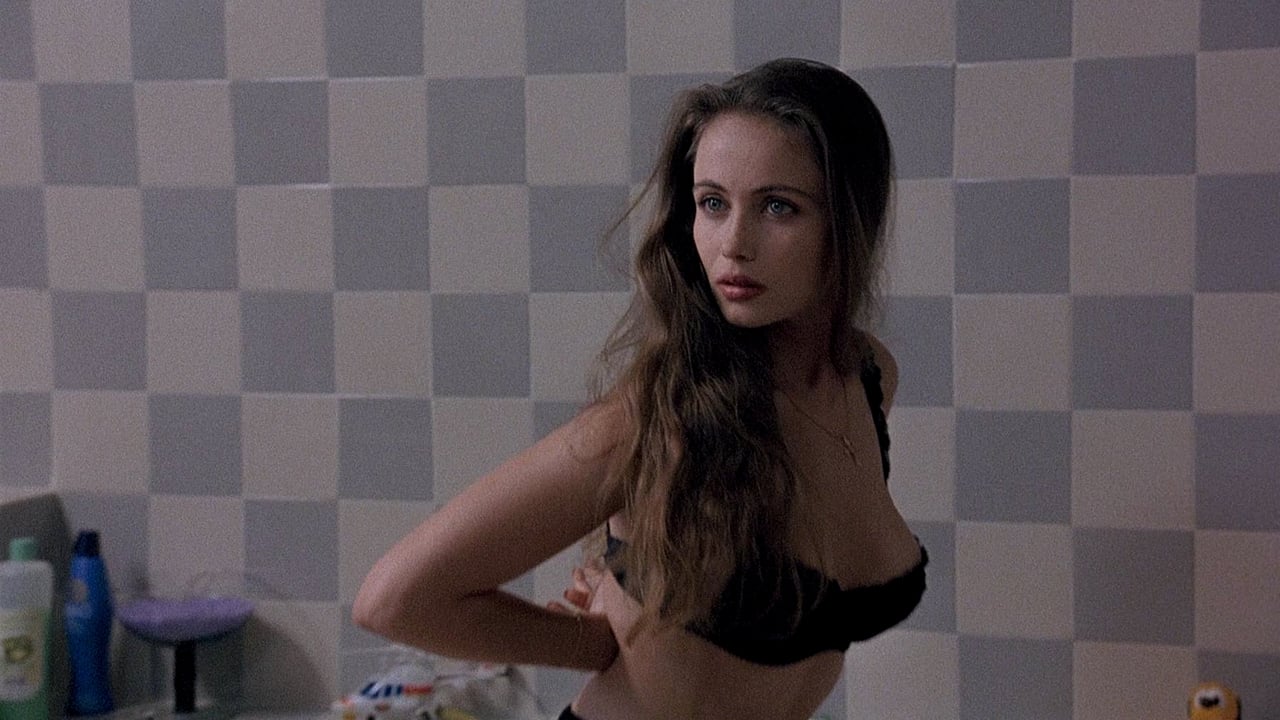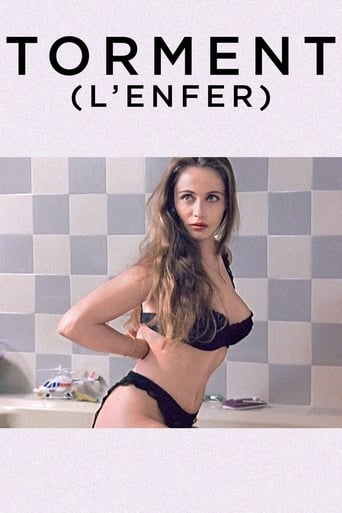

The owner of the Hotel Du Lac, Paul Prieur (François Cluzet), gets married with the beautiful and sexy Nelly (Emmanuelle Béart) and they have a boy. Nelly loves Paul and is pleasant with guests, and the insecure Paul feels that she is a woman out of his league.When Nelly spends some time with the handsome guest Martineau (Marc Lavoine), Paul follows her and becomes paranoid and delusional believing that she is unfaithful to him. His increasing obsession turns into madness that ends in an announced tragedy."L'Enfer" is a dramatic tale of insecurity, paranoia and madness by Claude Chabrol, with the story of a man that lives in hell with his jealousy and brings this hell to the life of his wife. Last time that I had seen this film was on 23 April 2000 and the story is timeless and has not aged. The tragic conclusion is predictable and my only remark is the attitude of Doctor Arnoux, who should have foreseen that the safety of Nelly was in danger with the insane Paul. Emmanuelle Béart is wonderfully cast to justify the obsession of Paul. My vote is eight.Title (Brazil): "Ciúme - O Inferno do Amor Possessivo" ("Jealousy - The Hell of the Possessive Love")Note: On 04 February 2018, I saw this film again.
... View MoreIf this film represents a faithful adherence to Clouzot's original script, one would have to say that the story may be regarded as the absolute apex/exemplar of Clouzot's understanding of psychology. At the same time, L'Enfer is absolutely a Claude Chabrol film, and the fact that it rests comfortably in either canon attests to the lasting parallels between the two masters.As with all of Chabrol's foremost creations, this is incisive social commentary masquerading under the banal tag of "psychological thriller". Though the film can be enjoyed without any deeper engagement with or meditation on its themes of Othello-esquire obsession/jealousy, I think some thought will reveal it to be a far more rewarding film than a superficial viewing might suggest.Situating/contextualizing the film in Chabrol's vast corpus of work, one finds in "L'Enfer" another nightmarish journey into the hazards of bourgeois sterility. Though one might say that the work is naturalistic in some respects (the intense violence that simmers beneath the genteel exterior is revealed in his disdainful disparagement of the neighboring competition), that the overreaching, emotionally volatile and profoundly sensitive husband is particularly prone to this type of neurosis, the telling proclamation of "sans fin" that closes the film suggests that the narrative is not one of isolated particulars, but a general affliction, a self-perpetuating tragedy engendered by flawed social mechanisms.Throughout his career, Chabrol has been especially critical of the life-denying entropy and suffocating claustrophobia of bourgeois marriage, a plight where the insatiably voracious woman feels her haplessness and subordination most acutely. This, in some respects, might be his finest evaluation of marriage and erotic love in general. The tensions explored throughout the film are far from novel, again we bear witness to the irresolvable Romantic preoccupation, the desire to possess and identify with a subjective other. Again, as with "Les Bonnes Femmes", we see the carnivorous, destructive male principle, eager to subdue, asphyxiate, smother and ultimately devour irrepressible femininity.Yet lest we distance ourselves from Paul's evident psychosis, Chabrol implicates marriage as an institution endorsed by society at large. Note Paul's perverse, masochistic pleasure in fabricating these outlandish fantasies, particularly the wild reverie of Emanuelle Beart entertaining the entire hotel in the attic. Is this the only way to preserve erotic love in the nauseating ennui of marriage, to continually reinvent the Other and, through wild imaginings, make him/her a stranger so as to escape the concreteness of conjugal reality? On another level, the film might be read as an Adlerian representation of modern neurosis, of a nervous man who is inadequately equipped for the rigours of social expectation, whose overreaching demand for absolute order and unity invariably drive him to dementia and a flight from reality. Chimeras of success and masculine authority elude him, undermined by personal insecurities and a willful, independent wife. How then, does he compensate for his lack of control? Refuge in the sadistic alternate reality that he manufactures throughout the movie.Technically, this movie is almost immaculate, featuring outstanding performances (Emmanuelle Beart is a force of nature) and repeated viewings affirm that it is a movie of great understanding. I'm not sure if this review made any sort of sense at all, but at the end of the day all I can do is urge you to immerse yourself in "L'Enfer".
... View MoreAs one of the originators of the New Wave, Claude Chabrol deserves a large amount of respect. His films such as Bon Femmes and Le Ceremonie put him in the high ranks of the best film makers, but in this case, L'Enfer, he does not match up to his own high standards. This could also just be my opinion since I didn't enjoy watching the downward spiral the characters go through.It was a ride I would rather not taken. Be that as it may, the film lacked a fullness of motivation for its lead, whose insanity seems to come from nowhere. Maybe again it is due to his mental illness, but as a viewer of the scene I needs to to know why. As France's Hitchcock, Chabrol needs to let us put the pieces together, as he let us do in his film The Unfaithful Wife, as we see the literal pieces of a puzzle reflecting the clues to the crime. If you love Emmanuel B'eart as we all do, you will find her and her fellow actors in good form, but the story falls flat.
... View More"L'Enfer" peers into the lives of a married-with-kid couple who run a resort hotel. She is beautiful and vivacious and he is jealous. As the film wears on, it appears we're supposed to believe the husband's jealousy slowly morphs into insanity though we're increasingly confronted with what seem to be his visions of his wife in compromising situations until the end when circumstance and a messy montage leave us confused and not knowing what to think. The result is a superficial story of a man being consumed with jealousy and some underlying theme which serves only to confound and make the denouement unsatisfying. An okay drama recommended for Chabrol fans only. (C+)Note - The DVD is watched had poor quality remastering with less than true color; the speckles, zits, and lines of dusty and scratched film; and abrupt cuts which appeared to be poor editing.
... View More